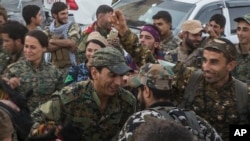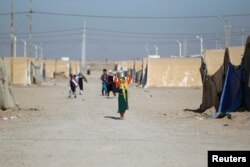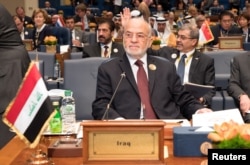The U.S.-led coalition against the Islamic State has been able to decimate the terror group's self-proclaimed caliphate in Iraq and Syria but these gains could be easily undercut by continued instability, a U.S. intelligence official warned Tuesday.
“In the near term, I worry about a loss of gains in Syria and Iraq,” David Cattler, of the Office of the Director of National Intelligence said Tuesday at the Washington Institute for Near East Policy.
“There is still a lot of work that needs to be done there,” he said.
The Islamic State terror group has lost thousands of fighters and has been expelled from more than 98 percent of territory it held for over three years in Iraq and Syria.
Last year the group was pushed out of its self-proclaimed capital of Raqqa in Syria and declared defeated in Iraq.
Now the coalition is helping the Syrian Democratic Forces to finish off IS remnants in eastern Syria near the Iraqi border.
IS global ideology
Cattler said IS ideology continues to resonate globally as it tries to adjust to the losses in the region.
In Syria, he warned that gains are threatened by increased complexity in the battlefield where allies and enemies compete for influence.
“The United States, Iran, Hezbollah, and Russia are all combating ISIS. We are fighting the same enemy as our adversaries. As such, they too will likely reap the benefits of a ‘peace dividend,’” Cattler said.
Meanwhile, Turkey and the Kurds, both U.S. allies, have turned on each other, thereby diverting attention from IS, he added.
Sunni Shiite dynamics
In Iraq, he said, gains are endangered by increased political instability fueled by reconstruction challenges and lack of trust between Sunni residents and the Shiite-dominated central government.
“Even if these do not lead to the group’s resurgence, fears of reprisals and Sunni grievances due to political marginalization, discrimination, and delays in reconstruction may hamper the reconciliation necessary for a sustained peace, which is a key U.S. objective," he said.
Islamic State is believed to have exploited Sunni fears of Shiite domination to seize large swaths of predominantly Sunni regions in 2014. Sunni leaders have already accused the Shiite Popular Mobilization Forces of committing crimes in Sunni areas retaken from IS and have asked for the disbanding of the group.
But the Shiite leaders reject those claims and say the group needs to be given an institutionalized role as an effective fighting force to prevent the re-emergence of IS.
Last Thursday the Iraqi Prime Minister Haider al-Abadi issued a decree formalizing the incorporation of the Shiite paramilitary group into the country's official security forces.
Reconstruction challenges
Meanwhile, the Iraqi government has another daunting task to complete: the post IS reconstruction of the country. The government says the reconstruction and normalization of war-torn areas is a priority, but an impossible task to undertake without international support.
An international conference in Kuwait last month collected about $30 billion mostly in credit facilities and investment to help rebuild Iraq's economy and infrastructure. But that amount felt short of Baghdad's appeal which said it needed $88 billion to recover from three years of war.
The delayed reconstruction efforts have also pushed millions of people to stay in refugee camps. The UN Migration Agency estimates some 3.5 million Iraqis have returned to their homes but over 3 million people remain internally displaced.
Norwegian Refugee Council, an aid group helping internally displaced Iraqis, last month reported that Iraqi authorities were forcing many civilians to return to their homes despite the risk of death from booby-traps or acts of vigilantism.
The group said the Iraqi government feared that delays in returning people could result in the postponement of parliamentary elections scheduled for May.






